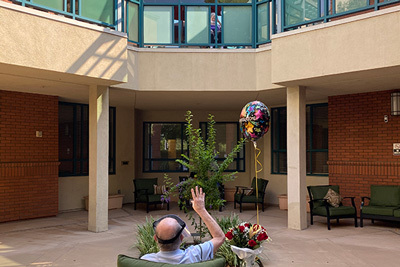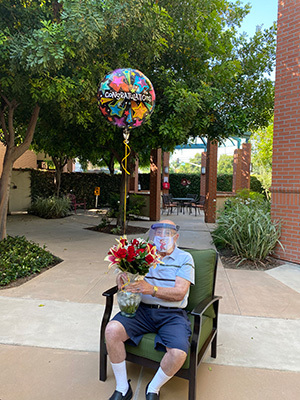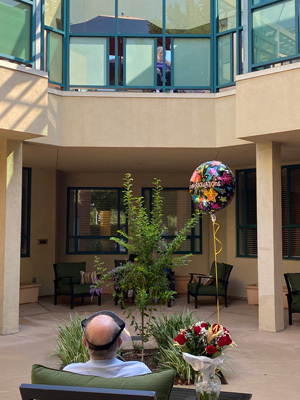At the Los Angeles Jewish Home, Love Conquers All


At the Los Angeles Jewish Home, Love Conquers All
The ongoing coronavirus pandemic has complicated romance around the world, but for Howard and Sheila Krupnick, love is everlasting—and a rose called by any other name would smell as sweet. The dedicated couple recently celebrated their 59th wedding anniversary at the Jewish Home with a visit lifted right out of Shakespeare.

When they first moved into the Jewish Home, Howard and Sheila were on different campuses due to the specialized care each required. However, the staff at the Home was determined to get them closer to one another, ultimately orchestrating a move that located them both in Eisenberg Village: Howard in the Newman Building and Sheila in the Goldenberg•Ziman Special Care Center.
Then COVID-19 struck, limiting the movement of residents as the Jewish Home worked tirelessly keeping staff and residents healthy and safe. Though they were now on the same campus, the threat of the coronavirus kept them confined to their respective rooms.
"The Krupnicks have a special connection, and it was tough to see them apart," recalls Kathleen Glass, Eisenberg Village's executive director. "As their anniversary approached, we knew it was time to get creative to find a safe way to bring them together."

Given the challenges of COVID-19, the reunion would have to be distanced— neither Howard nor Sheila could risk getting sick. But logistics were on their side: Glass realized that Sheila's location, on the second floor of Goldenberg•Ziman, would give her access to an upper-level outdoor patio—an ideal vantage point from which to gaze down at Howard, who could sit on a chair just below.
Then the planning began. "Our social worker went to the store to pick up balloons and flowers," Glass says. "When it was time for the meeting, our team brought the two of them to their designated spots, outfitted in PPE. Howard had a face shield, and Sheila had a mask, but the protective equipment didn't stop them from blowing kisses to each other."
What unfolded next was what Glass calls the couple's Romeo and Juliet moment. Howard asked Sheila if she would marry him again; her resounding "yes" was strong and steady as it carried down from the floor above. Extending the magic of the moment, Eisenberg Village Campus Rabbi Ron Goldberg led the couple in renewing their marriage vows.
"It was really beautiful on so many levels," Glass notes. "Sheila has dementia, but when she saw Howard, she absolutely lit up. You could see it from two stories away."

Glass says the event also provided a necessary boost for members of the Jewish Home staff. "Watching them together made a real impact on our team. We must face COVID-19 every day. Seeing Howard and Sheila interact was heartwarming and renewed our motivation to do what we do best: taking care of our residents and helping them fill their lives with as much love as possible during a time when so many things are being taken away from them because of the pandemic."
For Glass, the celebration was a reminder of another famous literary pronouncement, this one penned by the father of English literature, Geoffrey Chaucer. "Howard and Sheila's story has an important lesson for every one of us," Glass says. As Chaucer wrote,"Love conquers all!"